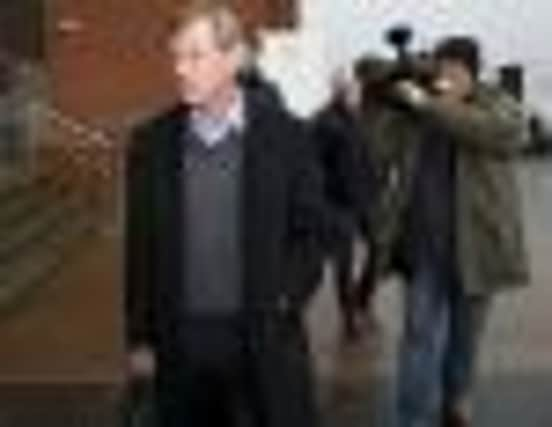Rangers crisis: Dave King fires volley at Sir David Murray


He had arranged to meet with Mike McGill, the finance director of the Murray Group. At the end of their discussion. and although Murray was sitting in the room next door, the South Africa-based businessman walked out on to the Charlotte Square pavement without so much as sticking his head around the door to say hello to the man who once persuaded him to invest £20 million in Rangers.
If that can be viewed as impolite, then it was nothing compared to the rude awakening which greeted Rangers supporters yesterday morning. Roughly halfway through a 1,500 word statement King, who also met with the Ibrox club’s administrators on his visit to Scotland last month, dropped the bombshell that would have sent every Rangers fan reeling, since it involved their deepest, darkest fear – liquidation. King described this process as “inevitable”. There was little that was said throughout the day, either by the administrators themselves or commentators analysing the desperate situation, which helped lift the supporters’ gloom following such a terrifying disclosure from someone who was once the second biggest shareholder at Ibrox, after Murray.
Advertisement
Hide AdAdvertisement
Hide AdNow, it seems, Murray and King don’t talk, or at least haven’t done so since May. This remained the case even after King had made the journey from South Africa to a room next door to Murray, who, back in 2000, had warmly welcomed him to the club.


The investment by King, which saw him appointed as a non-executive director on the Ibrox board, was part of a new share issue that aimed to begin dealing with the club’s then £40 million debt.
Another £3m was provided by private investors, including Trevor Hemmings, the owner of Blackpool Tower, and Alistair Johnston, the then vice-president of IMG, who first introduced Murray to King.
Little could anyone have imagined that, within 12 years, King would be minded to make such a pointed snub of the former Rangers owner. But now we know why he “purposely did not meet with David Murray”, as he described it yesterday. You don’t tend to shoot the breeze with someone just days before revealing that you intend to pursue them for a claim for £20 million.
This action has been taken “on the basis of non-disclosure by the then chairman, David Murray, of Rangers’ true financial position as far back as 2000”. Celtic, at the time of King’s initial investment, were the ones in dire straits, although it was a less apocalyptic, if more immediately evident, form of struggle. John Barnes had been sacked and Kenny Dalglish appointed caretaker manager. On the weekend before King’s investment was announced, Rangers had beaten Celtic 4-0.
Were they really the good times? Not according to King, who now believes he was “deceived” by Murray in respect of the true state of the club’s finances. King made his fortune after emigrating from Glasgow to South Africa in the 1970s to found an investment company, Specialised Outsourcing. He knew what was what in business and could hardly claim to have had the wool pulled over his eyes by Murray. Just months after King became a non-executive director, Rangers posted losses of £16.3 million. It didn’t require a particularly forensic form of due diligence to learn that the Ibrox club, although successful on the field, were living outwith their means off it. Yet King happily ploughed some of his wealth into Rangers and, now it has all gone wrong, he wants it back again – with interest, no doubt.
Not that it is for his own benefit, of course. King yesterday revealed his intention to reinvest the sum claimed back from Murray “into the restructured football club”, something which relies on two significant conditions – that King is successful in his claim against Murray, and, as he himself notes, he is able to satisfy the criteria for the Scottish Football Association’s “fit and proper” person’s test.
The fact he is fighting an on-going tax case with the South African authorities, who claim he owes as much as £200 million, suggests this could be problematic. It is a saga which has even seen a private plane owned by King impounded. At the end of last year, one of his seized vineyards in South Africa sold for just £4.75 million at auction. If the promises made by King hinge on him being given the green light by the SFA, then it is difficult to see how they will ever be delivered. Nevertheless, King has submitted himself to the test. “In view of my own well-publicised and acrimonious legal disputes with the authorities in the South Africa, I have taken it upon myself to approach the SFA in that regard in advance of considering an increased role in the club going forward,” he stated yesterday. “I will be guided by the SFA’s response in that regard.”